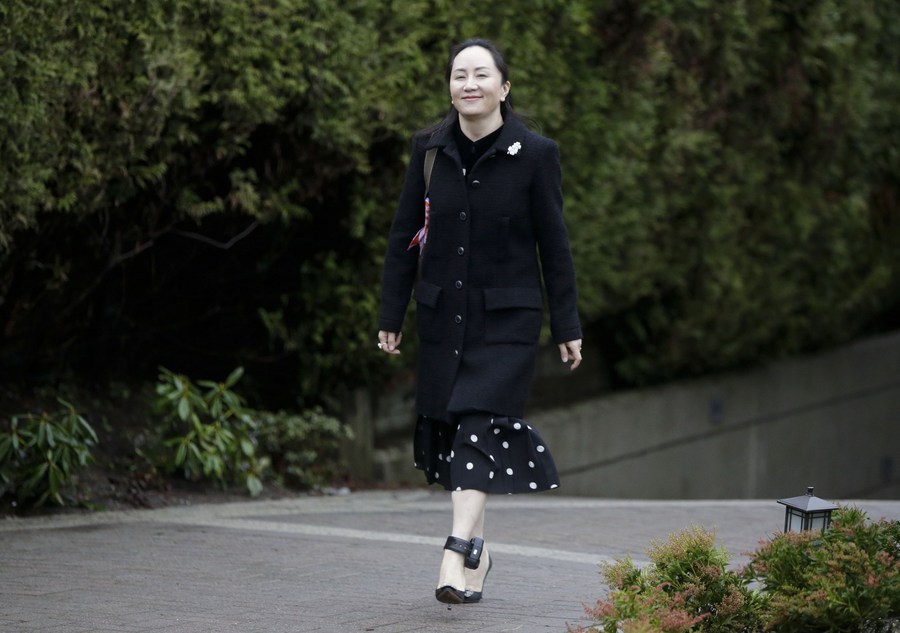


China's Huawei Chief Financial Officer Meng Wanzhou leaves her residence for the extradition hearing in Vancouver, Canada, Jan. 20, 2020. (Photo by Harrison Ha/Xinhua)
Lawyers for a senior executive for Chinese technology giant Huawei Technologies argued in a Canadian courtroom Monday that U.S. authorities used a misleading summary that “cherry picks” evidence in requesting her extradition.
Canada arrested Meng Wanzhou, the daughter of Huawei’s founder, at Vancouver’s airport in late 2018. The U.S. wants her extradited to face fraud charges. Her arrest infuriated Beijing, which sees her case as a political move designed to prevent China’s rise.
The U.S. accuses Huawei of using a Hong Kong shell company called Skycom to sell equipment to Iran in violation of U.S. sanctions. It says Meng, 48, committed fraud by misleading the HSBC bank about the company’s business dealings in Iran.
Defense lawyer Scott Fenton said the case against Meng hinges on an August 2013 PowerPoint presentation made to a HSBC executive during a lunch in Hong Kong.
In making its case the U.S. accuses Meng of failing to inform HSBC during the presentation that Huawei controls Skycom.
Fenton argued that the U.S. tried to prove its point using selected slides. But if the full presentation is viewed, Meng said Huawei had a “normal and controllable” relationship with Skycom.
“It is seriously misleading by omission,” he said.
Fenton said Meng supplied enough information for HSBC to make its own decisions.
“She told them everything they need to know to measure sanctions risks,” he said.
Meng appeared in court for the first time since May. She was wearing a tracking device as part of her bail agreement. She began the day wearing a mask but removed it as court continued.
Monday’s proceedings are part of Meng’s arguments that the extradition proceedings should be halted because of an abuse of process.
Her lawyers claim Canada Border Services Agency officers detained and questioned Meng without a lawyer, seized her electronic devices and compelled her to give up the passcodes before her official arrest.
They argue the Royal Canadian Mounted Police acted at the behest of the FBI to gather and share technical information about Meng’s laptop, phones, and tablets, in violation of the Extradition Act.
In May, Meng failed in a bid to end the extradition process when a Canadian judge ruled the allegations against her could constitute a crime in Canada as well.

 Award-winning photos show poverty reduction achievements in NE China's Jilin province
Award-winning photos show poverty reduction achievements in NE China's Jilin province People dance to greet advent of New Year in Ameiqituo Town, Guizhou
People dance to greet advent of New Year in Ameiqituo Town, Guizhou Fire brigade in Shanghai holds group wedding
Fire brigade in Shanghai holds group wedding Tourists enjoy ice sculptures in Datan Town, north China
Tourists enjoy ice sculptures in Datan Town, north China Sunset scenery of Dayan Pagoda in Xi'an
Sunset scenery of Dayan Pagoda in Xi'an Tourists have fun at scenic spot in Nanlong Town, NW China
Tourists have fun at scenic spot in Nanlong Town, NW China Harbin attracts tourists by making best use of ice in winter
Harbin attracts tourists by making best use of ice in winter In pics: FIS Alpine Ski Women's World Cup Slalom
In pics: FIS Alpine Ski Women's World Cup Slalom Black-necked cranes rest at reservoir in Lhunzhub County, Lhasa
Black-necked cranes rest at reservoir in Lhunzhub County, Lhasa China's FAST telescope will be available to foreign scientists in April
China's FAST telescope will be available to foreign scientists in April